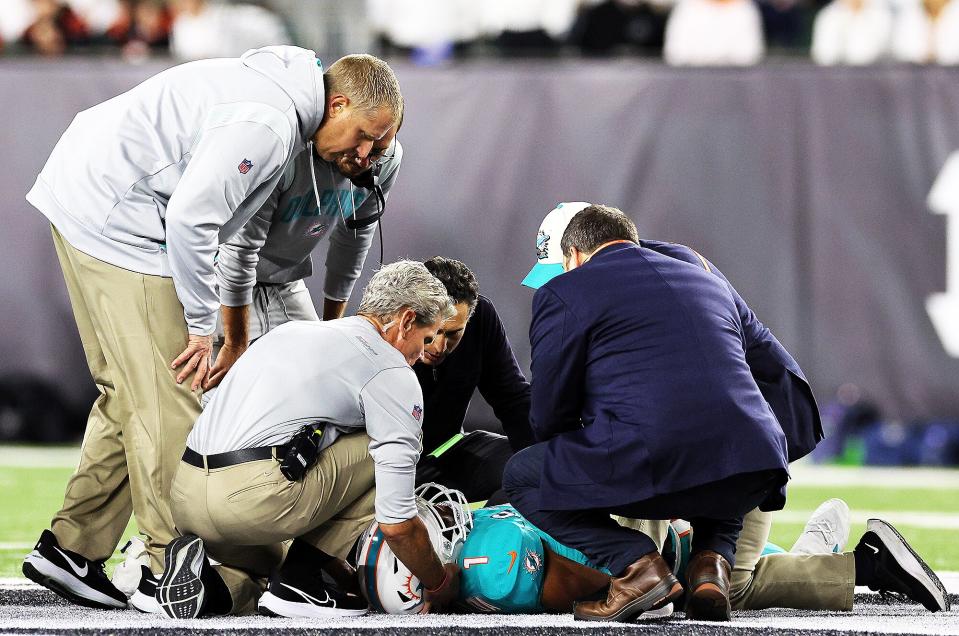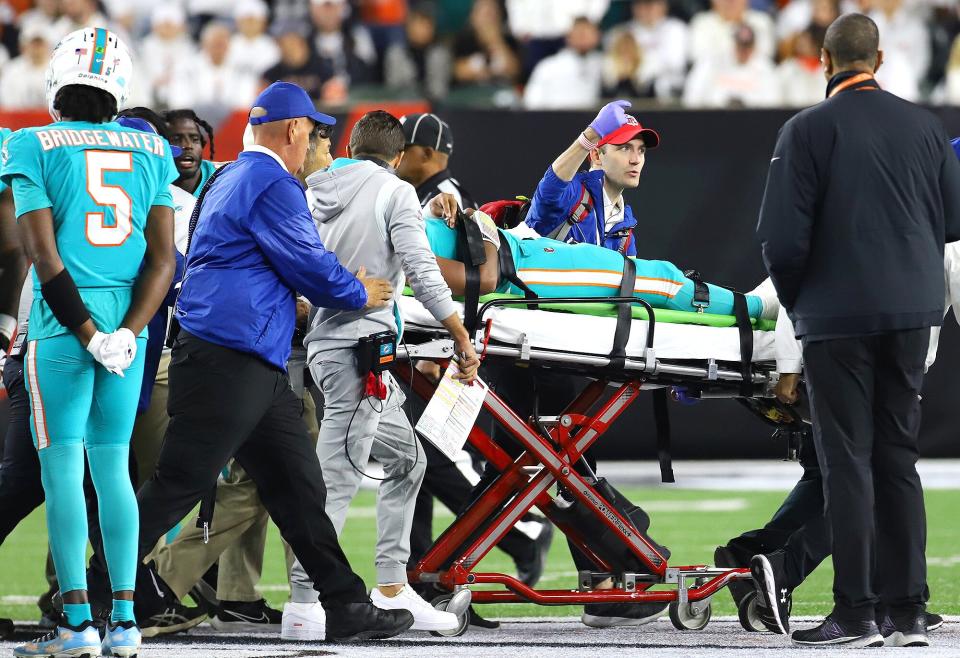Tua Tagovailoa Shouldn't Play the Rest of the Season After 2 Head Injuries, Concussion Expert Says

Andy Lyons/Getty Tua Tagovailoa
After his second head injury in just five days, a concussion expert says Miami Dolphins quarterback Tua Tagovailoa is at too high of a risk for severe brain damage to play the rest of the season.
On Thursday night, Tagovailoa was pulled off the field for signs of a concussion for the second time in five days. The 24-year-old had absorbed a hard hit during Sunday's game against the Buffalo Bills, and was seen swaying as he went for the next down before he was briefly removed from the game for concussion protocols. Tagovailoa returned in the second half after the Dolphins' doctors announced that he had a back injury — not a concussion.
That alone was "absurd," Dr. Chris Nowinski, a neuroscientist and the CEO of the Concussion Legacy Foundation, tells PEOPLE.
"Tua showed five distinct signs of a concussion," Nowinski explains. "First he grabbed his head when he hit the ground, which is usually a sign your head hurts. Then when he stood up he took two bad steps sideways and backwards because balance was clearly off. Then he shook his head side to side in a classic clearing up the cobwebs, meaning he had a visual disturbance. Then he fell to the ground in a very awkward way, and then when he stood up, the only reason didn't fall again is because his teammates held him up."
RELATED: Miami Dolphins' Tua Tagovailoa Suffers Second Head Injury in a Week During Game Against Bengals
"That's called, according to the NFL protocols, gross motor impairment. And that should mean he never returns no matter what."

Jeff Moreland/Icon Sportswire via Getty Tua Tagovailoa
Nowinski expected the Dolphins to hold Tagovailoa out for Thursday's game against the Cincinnati Bengals to let "his brain recover," but the team's doctors cleared him to play.
And in the second quarter, Tagovailoa was sacked, with his head again hitting the ground. In a scary moment, he was seen holding up his hands with his fingers frozen in place — a movement called a fencing response, or decorticate posturing.
"That means that his mid-brain was damaged, and it's worse than your run-of-the-mill concussion," Nowinski explains. "It's something you usually only see in stroke patients after parts of their cortex have died. It's a very uncomfortable thing to see."
RELATED: What Is CTE? All About Chronic Traumatic Encephalopathy
"That is a clear sign of a brain injury with brainstem dysfunction and warrants full concussion protocol," Dr. Ann McKee, a neuropathologist and director of Boston University's CTE Center, tells PEOPLE.
This time, Tagovailoa was taken to the hospital for an MRI — head coach Mike McDaniel said Friday that the quarterback was discharged that night and flew home to Miami with the team — but he could experience "horrible repercussions from two concussions in four days," Nowinski says.
When reached by PEOPLE, a rep for the Miami Dolphins pointed to comments from McDaniel and declined to comment further.
With likely two concussions in less than a week, "the immediate danger is something called second impact syndrome, or SIS, a second concussion on top of a previous, unrecovered, concussion," McKee explains. "SIS can have dire consequences, including permanent catastrophic neurological injury."
RELATED: Disease Caused by Concussions and Head Trauma Led to Young Football Player's Suicide: 'He Wanted Us to Tell His Story,' Says Mom
"The most common symptoms after concussion are headache, dizziness, fatigue, feeling foggy. But there's a 26-symptom checklist, so a lot of things could be wrong," Nowinski, a former wrestler and football player, says. "He could have sleep issues, could have vision issues, he could have ringing in his ears, he could develop depression and irritability over the next few days. Your brain controls everything, and so anything can go wrong."
"What I'm most worried about is mental health. There's very clear evidence that your odds of developing a new mental health disorder after a concussion can increase two or three times when you talk about things like anxiety, depression, self-harm, and suicidal ideation."
RELATED: Late NFL Star Demaryius Thomas, 33, Had Stage 2 CTE That Led to Cardiac Arrest, Parents Share
And after two head injuries in five days, Nowinski says Tagovailoa — who is now in concussion protocol — should not play the rest of the season.
"If he survives two concussions in four days, God bless him, but three concussions in a season, the odds that he has a life-changing symptoms just keep increasing," Nowinski says.
"We all will watch and wait and hope that he's one of the lucky ones."

 Yahoo Movies
Yahoo Movies 